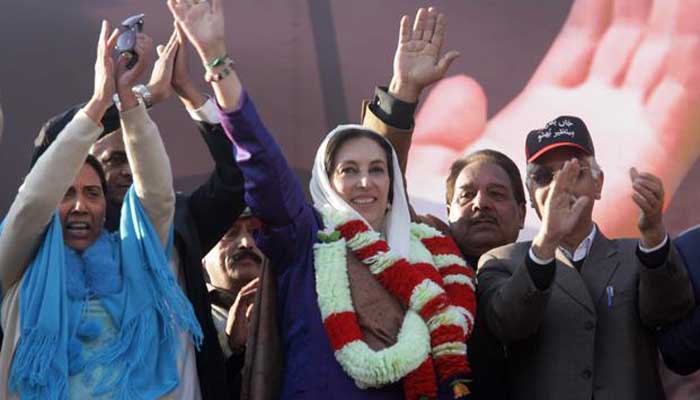Staff Report
ISLAMABAD: It was the day 16 years ago when one of Pakistan’s most loved and popular political leaders, Ms Benazir Bhutto, was assassinated in a suicide bomb blast-cum-gun shooting attack outside the famous Liaquat Bagh as she was about to depart after addressing a big election rally on 27 December 2007.
The events unfolding soon after the unfortunate incident continued to make the incident murkier, casting long shadows of doubts and suspicions as the nation seemed to be sucked in a pal of gloom and despair. The public reaction to the violent death of the most popular political leader was spontaneous and understandable.
With each passing day, the mystery surrounding the assassination of Benazir Bhutto continued to grow. First with the change of the route of her return after addressing the rally, a hurried washing of the crime scene by the administration, washing away critical evidence, and a shake-up in top local bureaucracy. Finally, a press conference by the spokesperson of the Ministry of Interior, announcing the incident being a terror strike and even releasing intercepts of alleged terrorists’ telephonic conversations and even sketches of two persons purported as the alleged terrorists belonging to Tehreek-e-Taliban Pakistan (TTP).
BB’s party, the Pakistan People’s Party (PPP) won the general elections in January 2008 with a thin majority and formed a coalition government and with that, the demand for a fair and independent investigation into the unfortunate incident grew louder and louder.
The military dictator, General Pervez Musharraf, called an investigation team from Scotland Yard of the United Kingdom to investigate the killing of Benazir Bhutto and submit a report on January 8, 2008. However, former President Asif Ali Zardari, the spouse of Benazir Bhutto, and the Pakistan People’s Party rejected the Scotland Yard report and openly accused General Pervez Musharraf of being behind the assassination of Benazir Bhutto, while declaring it inept and full of doubts.
There were repeated demands for an independent inquiry by the UN into the incident by the PPP government and eventually, Bank Ki-Moon, the then Secretary-General of the United Nations announced in February 2009 for sending a high-level UN Fact Finding Mission to look into the incident. The UN Fact-Finding Mission arrived in Islamabad on 16 July 2009 and started their job, during which they held extensive discussions with concerned persons and departments. The UN Fact Finding Mission eventually released its report but that was vague and without any conclusive remarks regarding identifying the culprits behind the tragic incident.
The UN Fact-Finding Mission report was rejected by former President Asif Ali Zardari and the PPP citing reasons that it contains no substance and no efforts were made by the UN Mission to point out the people and the elements behind the gruesome suicide attack on two-time Prime Minister of Pakistan, Ms Benazir Bhutto.
It may be recalled that the former military dictator, Gen Pervez Musharraf, himself admitted that there was credible information available that Benazir Bhutto would be targeted by the ‘terrorists’ and even said that the then Director-General Inter-Services Intelligence (ISI), Gen Nadeem Taj, personally met Benazir Bhutto less than 24 hours ago (on December 26) at her residence and tried to convince her not to go to Liaquat Bagh to address her last public rally ahead of the general elections.
However, reportedly, Benazir Bhutto refused to buy the argument of DG ISI regarding threats to her life and the possibility of a lethal attack aimed at eliminating her by purported terrorist groups, especially Tehreek-e-Taliban Pakistan (TTP). The meeting was held in the backdrop of a shooting incident near Nowshera on the convoy of Benazir Bhutto when she was returning from Peshawar after addressing a public rally.
She went ahead with her plan of addressing the rally in Rawalpindi and fell victim to the dastardly suicide bombing-cum-gun shooting attack minutes after she left Liaquat Bagh after addressing a very successful rally.
Over the last 16 years, there have been multiple theories behind the elimination of Benazir Bhutto but there are hardly any solid evidence available to corroborate those theories.
But there were enough events that followed BB’s assassination which strongly indicated that all out efforts were made to hide the facts to confuse things and mislead the investigators who tried to solve the ‘mystery’.
Pakistan People’s Party (PPP) remained in power from 2008 till 2013 but was unable to take any meaningful steps to find the people and forces behind the assassination of Benazir Bhutto, the two-time Prime Minister of Pakistan and as the day marks the 16th anniversary of her violent death the mystery is still unsolved.



